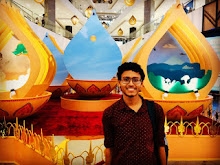
“Life is a sculpture,
The sculpture
might have a shining face and herculean body,
But the sculptures as a rule are deaf, mute and blind.”
This is the
kind of poetry that makes me shudder with its honesty, it is the kind that makes
me validate my cynical views on the dreariness of life. As much as I want not
to completely agree to what the poems convey, the blatant audacity and its omnipresence
is such that I have to surrender to them at the end of the day.
Aditya Choudhary
through his poetry collection “Believe the make-believe” shoots at the
sugarcoated, too-good-to-be-true notion of life; and fearlessly talks about the
broken promises, shattered dreams and the massive pain attached to it. His
views are sceptical and transparent, and he doesn’t attempt to hide the murky
lanes and dark alleys of our cycle of life, that he chooses to write upon.
The poet’s pain
and heartbrokenness get portrayed via a strange combination of verses, raw
emotions and conclusions. His agony at the hypocrisy of fate, his reluctance to
believe the apparent goodness of human intentions, his anger at the futility of
the tiny little life he harps upon—all of this sees a very prominent and vivid
expression. Themes like warmongering, inner turmoil, double standards in people,
appearance vs. reality lingers in between the lines, reminding the readers again
and again that life with its battles and heartbreaks, is indeed a tough ordeal
to endure.
The disparity in
between what is told and what actually is, the stark difference between what we
believe and what we are made to believe—is, in my opinion, the central idea that
the book revolves around. The underlying message perhaps is a fierce cry rising
from the core of the heart; the heart that is made to withstand aeons of torture,
the heart that makes us realize the subtleties of our futile existence. With
the hubbub of incidents and conflicts popping around us one after another, it
is very easy to be trapped in a delusion. It is in those times that we need a
violent shake that will make us visit the raw reality of the life around, and explore
its aspects that are concealed yet pertinent. This book, I believe, is that
dose of the harsh realism you might be looking for.
Talking about
this delusional mindset and the shift between what is real and what is
makeshift, it is very appropriate to note that such reveries are in reality,
very desired and craved for. Often, we are so battered by the unpredictability
of life, and weighed down by its hypocrisy— that all we crave for is a little
bubble of self-admiration that we construct around ourselves. This barrier that
we choose to shield us with, is after all mingled with fake promises and over-simplifications
yet again. Thereby, staying and acting in delusion is never really, in my
opinion, a very wise thing to do. It is almost always better to stay in the present,
and extract hints of futuristic growth and hope from this drought of life.
“A scary tactic
of the dark lord is upon us,
All of us are pawns
of the grand design,
Moving,
jumping, thumping and humping,
Exactly when we
get the signal.
…
…
Sometimes the
pawn wants to run away,
To a special
place where the wind doesn’t blow dirt with it,
And not every
alley necessarily smells like shit,
…
…
Where the
children danced every time it rained,
…
…
Sometimes the pawn
also wishes to live a life of a creator,
Sometimes he
too wants to make the pawns believe
In his
make-believe world and run along in it.”
Through this
book, we can affirm our belief in the importance of self-exploration and realization
of the war that rages within us. The poet, through his direct allegations and honest
expressions, paints a picture that speaks of falsities and dualities. His book talks
about things that perhaps every mortal being will be able to relate to. Each of
us, at some point of time, have been made to stand at the threshold of frustration
with life, overburdened and tired. These poems make us live life without hiding
its misalignment with our mere intentions.
Although I agree to the backdrop the poet chooses to write about, I wish that the poems could have had some hint of fair play. It was so burdened with pessimism and scepticism, that it failed to point fingers at the simple joys in life that also exist equally. The poems, in my opinion, should have dealt with the co-existence of light and dark, winners and losers and haters and lovers a bit more than what was put to words. It that had been done, it would have enhanced its perennial message and conclude with much more hope for better times to come.
➦ Don't miss the chance to grab this book. Purchase it here !
➦ Connect to the poet at @author_aditya
Disclaimer: This review is in lieu of a review copy.





Post a Comment